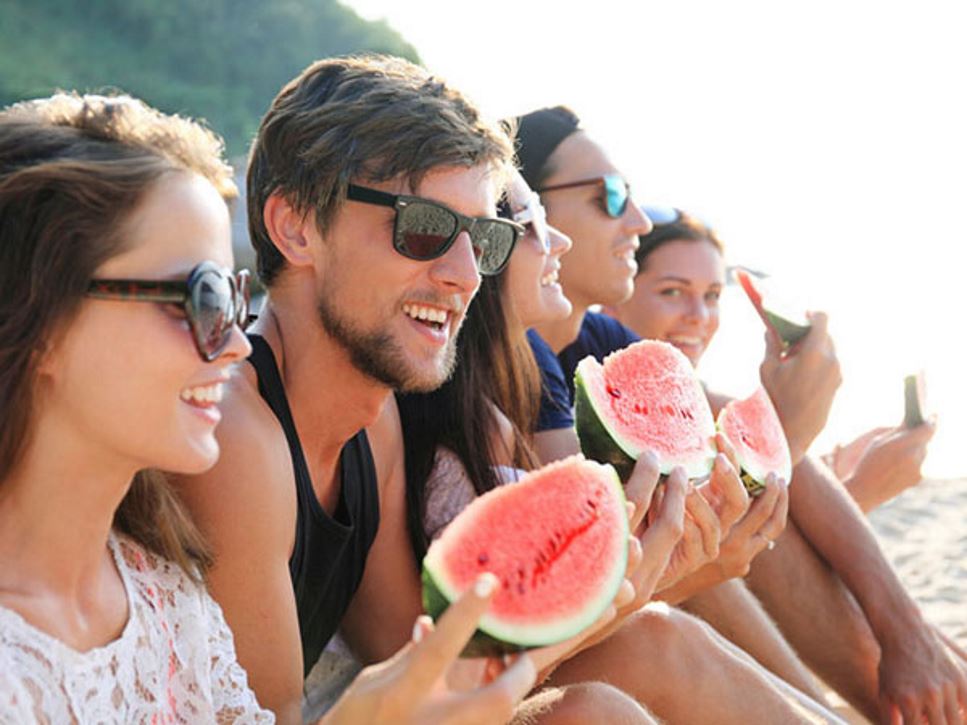Every summer, Americans flock to beaches to get away from it all. Unfortunately, poor nutrition, lack of hydration and fierce sunburn can leave you wiped out after a supposedly relaxing beach day. Make the most of your hard-earned rest time by giving your beach day a healthy makeover.
Bring Healthy Snacks
The prices at beachside cafes and hot dog stands can add up. Save money and eat well by bringing snacks with you, such as:
- Raw or dry-roasted nuts
- Pre-washed and cut fruit and veggies (packed in a cooler)
- Whole-grain crackers
- Roasted chickpeas
- Trail mix
- Dried mixed fruit
If you do purchase food at the beach, look for nourishing and refreshing foods such as hummus wraps and smoothie bowls. Also look for tasty choices such as grilled corn on the cob, fruit popsicles, low-fat frozen yogurt topped with fresh fruit, baked chips, grilled chicken salads and sandwiches on whole-grain bread.
When packing a cooler for the beach, don't forget plenty of water! Refresh yourself on a hot day with a reusable bottle of ice cold water with lemon or mint. If you crave something fizzy, hydrate with sparkling water.
Protect Your Food
A beach day is relaxing; a bout of food poisoning is anything but. The Centers for Disease Control and Prevention estimates that about 1 in 6 Americans get sick from foodborne diseases each year. Pack your beach snacks cautiously and don't leave food sitting out for longer than two hours, or one hour if the temperature reaches 90°F or higher.
Before you pack for your day at the beach, give your cooler and tote a thorough cleaning. Always start with a clean cooler, washing it out with mild soap and water and rinsing thoroughly. It's also important to thoroughly wash containers and re-useable bags to remove all food residues and minimize the potential for bacterial growth.
Pack your cooler with plenty of ice if you're bringing perishable foods to the beach. Your cooler must maintain food at a temperature of 40°F or lower. Keep a thermometer in your cooler and, if possible, store coolers in the shade.
If you're cooking out at the beach, follow these do's and don'ts:
- Do use different plates and utensils to handle meat, including separate sets for raw and cooked meat.
- Do bring a food thermometer to make sure grilled meats reach a safe internal temperature (160°F for hamburgers, 165°F for chicken).
- Don't thaw frozen meat in the sun.
- Don't start cooking meat, store it and then finish it later on the grill. This causes bacteria to multiply.
Some beaches don't have facilities with running water, so pack hand sanitizer and use it before and after cooking or eating food. Also, bring some empty bags for your garbage — don't leave your trash on the beach!
Stay Hydrated
Don't get so caught up playing in the water that you forget to drink water. Summer heat combined with swimming exertion can leave you dehydrated. You may not notice you're sweating when you're in and out of the water. Drinking fluids and consuming a wide variety of foods can help you remain hydrated when the temperatures rise. Watermelon is a great hydrating snack for a summer day at the beach.
A cold beer may sound appealing on a hot day, but drink alcohol cautiously and in moderation. Drinking too much alcohol and swimming is dangerous. Alcohol consumption can affect our coordination and judgment. Your risk of drowning increases as your blood alcohol concentration rises. Alcohol also is a mild diuretic, increasing urine output, which can hasten dehydration. Dehydration warning signs include:
- Thirst
- Headache
- Dry mouth
- Decreased urine output
- Sleepiness or tiredness
- Dizziness or lightheadedness
Mild dehydration can be treated by drinking water, but if you experience more severe symptoms (extreme thirst, lack of sweat or tears, a rapid heartbeat, weakness, breathing rapidly or delirium), call 911 immediately. Severe dehydration is a medical emergency.
Enjoy a healthy day at the beach — fuel your body with nutrient-rich snacks, practice food safety and stay hydrated. Finally, don't forget the sunscreen!
Find a Nutrition Expert
Looking for credible nutrition information and recommendations? The Academy of Nutrition and Dietetics' network of credentialed food and nutrition practitioners are ready to help!

